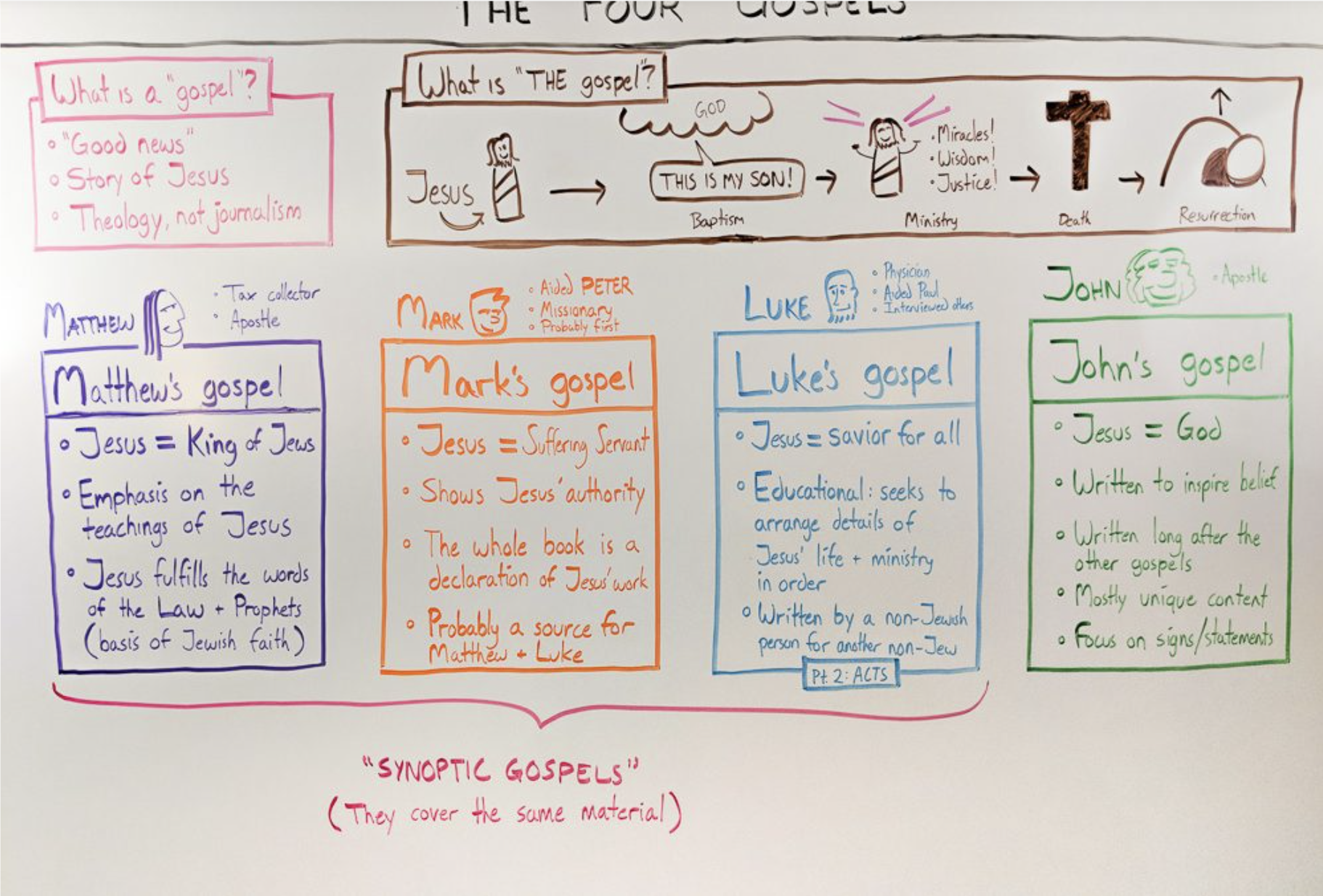The Old Testament is divided into five sections: the Pentateuch (Genesis through Deuteronomy), the historical books (Joshua through Esther), the poetic books (Job through Song of Solomon), the Major Prophets (Isaiah through Daniel), and the Minor Prophets (Hosea through Malachi). The Old Testament was written from approximately 1400 B.C. to approximately 400 B.C. The Old Testament was written primarily in Hebrew, with a few small sections written in Aramaic (essentially a variation of Hebrew).
The Old Testament deals primarily with the relationship between God and the nation of Israel. The Pentateuch deals with the creation of Israel and God establishing a covenant relationship with Israel. The historical books record Israel's history, its victories and successes along with its defeats and failures. The poetic books give us a more intimate look at God’s relationship with Israel and His passion for Israel to worship and obey Him. The prophetic books are God’s call to Israel to repent from its idolatry and unfaithfulness and to return to a relationship of obedience and spiritual fidelity.
Abraham
The patriarch of the Hebrew people. Abraham is traditionally called “Father Abraham” because the Israelite people and their religion descend from him. God establishes his covenant, or promise, with Abraham, and God develops an ongoing relationship with the Israelites through Abraham’s descendants. Abraham practices the monotheistic worship of God, and his resilient faith in God, despite many challenges, sets the pattern for the Israelite religion’s view of righteousness.
Moses
The reluctant savior of Israel in its exodus from Egyptian bondage to the promised land. Moses mediates between God and the people, transforming the Israelites from an oppressed ethnic group into a nation founded on religious laws. Moses’s legendary miracles before Pharaoh, along with his doubts and insecurities, make him the great mortal hero of the Old Testament. He is the only man ever to know God “face to face.” Four out of the five books of the Pentateuch are devoted to Moses and Israel’s activities under his leadership.
David
The king of Israel and the founder of Jerusalem, or “Zion.” David’s reign marks the high point of Israel in the biblical narrative. Although David’s claim to the throne is threatened by Saul and by David’s own son, Absalom, David maintains his power by blending shrewd political maneuvering with a magnanimous and forgiving treatment of his enemies. David’s decision to bring the Ark of the Covenant—Israel’s symbol of God—to the capital of Jerusalem signals the long-awaited unification of the religious and political life of Israel in the promised land.
Jacob
The grandson of Abraham, Jacob is the third patriarch of the Israelite people and the father of the twelve sons who form the tribes of Israel. Jacob experiences a life fraught with deception, bewilderment, and change. He steals his brother Esau’s inheritance right and wrestles with God on the banks of the Jabbok River. Appropriately, the nation that springs from Jacob’s children derives its name from Jacob’s God-given name, “Israel.” “Israel” means “struggles with God,” and Jacob’s struggles are emblematic of the tumultuous story of the nation of Israel.
Joseph
Jacob’s son and the head official for the Pharaoh of Egypt. Despite being sold into slavery by his brothers, Joseph rises to power in Egypt and saves his family from famine. Joseph’s calm and gracious response to his brothers’ betrayal introduces the pattern of forgiveness and redemption that characterizes the survival of the Israelite people throughout the Old Testament.
Saul
Israel’s first king. After God chooses Saul to be king, Saul loses his divine right to rule Israel by committing two religious errors. Saul acts as a character foil to David, because his plot to murder David only highlights David’s mercy to Saul in return. Saul’s inner turmoil over the inscrutability of God’s exacting standards makes him a sympathetic but tragic figure.
Solomon
David’s son and the third king of Israel. Solomon builds the opulent Temple in Jerusalem and ushers in Israel’s greatest period of wealth and power. God grants Solomon immense powers of knowledge and discernment in response to Solomon’s humble request for wisdom. Solomon’s earthly success hinders his moral living, however, and his weakness for foreign women and their deities leads to Israel’s downfall.
Elijah & Elisha
The prophets who oppose the worship of the god Baal in Israel. After the division of Israel into two kingdoms, Elijah and his successor, Elisha, represent the last great spiritual heroes before Israel’s exile. Their campaign in northern Israel against King Ahab and Jezebel helps to lessen Israel’s growing evil but does not restore Israel’s greatness. Israel’s demise makes Elijah and Elisha frustrated doomsayers and miracle workers rather than national leaders or saviors.
Adam & Eve
The first man and woman created by God. Adam and Eve introduce human evil into the world when they eat the fruit of a tree God has forbidden them to touch.
Noah
The survivor of God’s great flood. Noah obediently builds the large ark, or boat, that saves the human race and the animal kingdom from destruction. Noah is the precursor to Abraham, because Noah represents the first instance of God’s attempt to form a covenant with humanity through one person.
Isaac
Abraham’s son and the second member in the triumvirate of Israel’s patriarchs. Isaac’s importance consists less in his actions than in the way he is acted upon by others. God tests Abraham by commanding him to kill his son Isaac, and Isaac’s blindness and senility allow his own son Jacob to steal Isaac’s blessing and the inheritance of God’s covenant.
Aaron
Moses’s brother, who assists Moses in leading the Israelites out of Egypt. God designates Aaron to be the first high priest in Israel. The quiet Aaron often stands between Moses and the people to soften Moses’s angry response to their sinful behavior.
Joshua
The successor of Moses as Israel’s leader. Joshua directs the people in their sweeping military campaign to conquer and settle the Promised Land. Joshua’s persistent exhortations to Israel to remain obedient to God imply that he doubts Israel will do so. His exhortations foreshadow Israel’s future religious struggles.
Samson
One of Israel’s judges and an epic hero who thwarts the neighboring Philistines with his superhuman strength. Samson is rash, belligerent, and driven by lust for foreign women—qualities that contradict Jewish religious ideals. Samson’s long hair is both the source of his strength and the symbol of his religious devotion to God as a Nazirite. Samson’s character demonstrates that in the bible, heroic potential is gauged not by human excellence but by faith in God.
Samuel
The last of Israel’s judges and the prophet who anoints both Saul and David as king. Samuel fulfills political and priestly duties for Israel, but he ushers in Israel’s monarchy mainly as a prophet—one who pronounces God’s words and decisions. Samuel’s stoic and aloof position in Israel allows Saul to struggle with God and his fate on his own.
Absalom
David’s son, who attempts to overthrow his father’s throne. Absalom’s violent rise to power suggests that the evil that corrupts Israel comes from within.
Joab
King David’s loyal military commander. Joab serves as a foil to David’s successful combination of religion and politics. Joab’s reasonable desire to see justice and retribution delivered to the kingdom’s traitors emphasizes the unusual quality of David’s kindness to his enemies.
Rehoboam & Jeroboam
The opposing kings who divide Israel into the northern kingdom of Israel and the southern kingdom of Judah. Rehoboam and Jeroboam introduce rampant worship of idols and false gods into their kingdoms. Each king acts both as a point of contrast and a double, or mirror, for the other, allowing the biblical reader to trace the rapid growth of evil in Israel’s two kingdoms.
Ahab & Jezebel
The most wicked rulers of Israel. Ahab and Jezebel spread cult worship of the pagan god Baal throughout the northern kingdom. Dogs gather to eat their blood at their deaths, fulfilling Elijah’s prophecy.
Esther
A timid Jewish girl who becomes the queen of Persia. Esther boldly and cunningly persuades the king of Persia to remove his edict calling for the death of the exiled Jews.
Job
The subject of God and Satan’s cosmic experiment to measure human faithfulness to God in the midst of immense pain. Job scorns false contrition and the advice of his friends, preferring instead to question God’s role in human suffering. He retains an open and inquisitive mind, remaining faithful in his refusal to curse God.













































